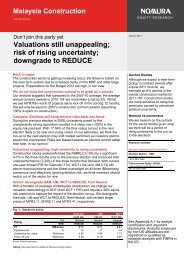Download PDF - ETP - Pemandu
Download PDF - ETP - Pemandu
Download PDF - ETP - Pemandu
You also want an ePaper? Increase the reach of your titles
YUMPU automatically turns print PDFs into web optimized ePapers that Google loves.
<strong>ETP</strong> ANNUAL REPORT 2011<br />
The implementation targets for the proposed amendments are<br />
presented in Exhibit 13.15.<br />
Exhibit 13.15<br />
232<br />
Targets for 2011<br />
To be tabled in October 2011 in<br />
Parliament for Second Reading:<br />
• Employment Act 1955 Phase 1<br />
- 28 amendments to the<br />
current provisions<br />
- 17 new provisions<br />
- 2 provisions repealed<br />
Target achieved as amendments passed<br />
in Parliament in December 2011<br />
Targets for 2012<br />
To be endorsed by Cabinet:<br />
• Minimum Wage<br />
To be tabled in Parliament:<br />
• Minimum Retirement Age<br />
• Industrial Relations Act<br />
• Private Employment<br />
Agencies Act<br />
These amendments serve to provide clarity, ensure the appropriate<br />
level of enforcement in order to provide fair treatment of workers<br />
without protecting obsolete jobs whilst reducing the cost of<br />
labour management in business. The Government has had a<br />
series of syndications with relevant parties across the spectrum<br />
and believe that alignment is critical for us to move forward.<br />
Besides the amendments covered in the labs, minimum wage is<br />
a key reform initiative which is currently being addressed by the<br />
Ministry of Human Resource (MOHR), with an announcement<br />
expected to be made in the first half of 2012.<br />
Achievements<br />
Employment Act 1955<br />
The 1st phase of amendments to the Employment Act 1955 had<br />
been passed in the Parliament (Lower House) in December 2011.<br />
The amendments, among others include:<br />
1. Section 2 (Amendments to definition of contractor for labour)<br />
2. Section 19 (Time of payment of wages)<br />
3. Section 22 (Advancement of wages)<br />
4. Section 25 (Payment of wages through bank account)<br />
5. Section 37 (Entitlement of maternity leave and maternity<br />
allowance)<br />
6. Section 60D (Malaysia Day as a mandatory gazetted public<br />
holiday)<br />
7. Section 60K (Duty to inform Department of Labour on the<br />
termination of service of foreign employees)<br />
New provisions include:<br />
1. Section 2 (Definition of foreign domestic servant)<br />
2. Section 33A (Registration of contractor for labour with the<br />
Department of Labour)<br />
3. Section 44A (Maternity leave)<br />
4. Section 57A and 57B (Registration of domestic servant with the<br />
Department of Labour)<br />
5. Part XVA (Sexual Harassment)<br />
Minimum Wage<br />
Minimum wage was not directly covered in the SRI labs but as a<br />
key reform initiative, the MOHR has started work on minimum<br />
wage since 2010. The National Wage Consultative Council (NWCC)<br />
was set up in September 2011 pursuant to the National Wage<br />
Consultative Council Bill which was passed in Parliament in July<br />
2011. The NWCC is tasked to recommend the minimum wage<br />
taking into account various sectors, regions and jobs. The council<br />
consists of economists, academicians and industry experts and will<br />
present its recommendations on the definition of minimum wage<br />
to the Cabinet in first half of 2012, followed by an announcement<br />
to the public. A comprehensive minimum wage is important to<br />
ensure workers’ rights to a fair wage system are protected whilst<br />
also minimising cost of doing business for employers.<br />
Minimum Retirement Age<br />
To increase productivity and retain knowledge workers in Malaysia,<br />
it has been proposed that a minimum retirement age is set for the<br />
private sector at 60 years, in line with a similar move in the public<br />
sector. Hence, the Minimum Retirement Age Bill will be tabled in<br />
Parliament in 2012.<br />
Focus on Upskilling and Upgrading<br />
the Workforce<br />
In order to make a transformative impact on an entire NKEA sector,<br />
skills and competitiveness of the critical mass of the workforce<br />
needs to be addressed. Therefore, the interventions that will be<br />
proposed for implementation will address the workforce who are<br />
working post SPM, technical and vocational schools, tertiary and<br />
continuing life-long education.<br />
Five NKEA sectors have been identified as Quick Wins i.e. some<br />
of these are initiatives were implemented in 2011 with the rest<br />
expected to be implemented in 2012. These sectors are Oil, Gas<br />
and Energy, Tourism, Electronics and Electrical, Communications<br />
Content and Infrastructure and Business Services–Outsourcing<br />
and Data Centres. To ensure sustainability in implementation,<br />
the labs also addressed short-medium term and long term<br />
interventions. The short-medium term interventions require<br />
collaboration of various industry players, educational institutions<br />
and government to address the 12 National Key Economic Areas<br />
(NKEAs). Longer term interventions aim to develop sustainable<br />
sector-led approach to address NKEA skills needs. These measures<br />
are taken to ensure Malaysia will be equipped with a more skilled<br />
workforce to meet the target of a high-income economy in 2020.








